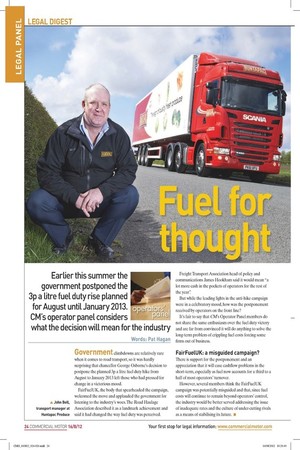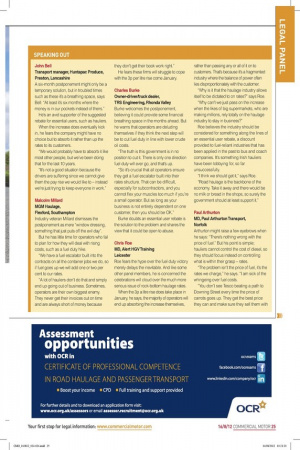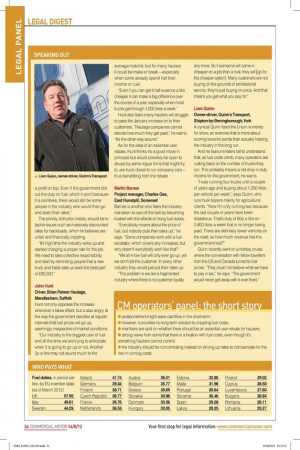Fuel for thought
Page 16

Page 17

Page 18

If you've noticed an error in this article please click here to report it so we can fix it.
Earlier this summer the government postponed the 3p a litre fuel duty rise planned for August until January 2013. CM’s operator panel considers what the decision will mean for the industry
Words: Pat Hagan Government climbdowns are relatively rare when it comes to road transport, so it was hardly surprising that chancellor George Osborne’s decision to postpone the planned 3p a litre fuel duty hike from August to January 2013 left those who had pressed for change in a victorious mood.
FairFuelUK, the body that spearheaded the campaign, welcomed the move and applauded the government for listening to the industry’s woes. The Road Haulage Association described it as a landmark achievement and said it had changed the way fuel duty was perceived. Freight Transport Association head of policy and communications James Hookham said it would mean “a lot more cash in the pockets of operators for the rest of the year”.
But while the leading lights in the anti-hike campaign were in a celebratory mood, how was the postponement received by operators on the front line?
It’s fair to say that CM’s Operator Panel members do not share the same enthusiasm over the fuel duty victory and are far from convinced it will do anything to solve the long-term problem of crippling fuel costs forcing some irms out of business.
FairFuelUK: a misguided campaign?
There is support for the postponement and an appreciation that it will ease cashlow problems in the short-term, especially as fuel now accounts for a third to a half of most operators’ turnover.
However, several members think the FairFuelUK campaign was potentially misguided and that, since fuel costs will continue to remain beyond operators’ control, the industry would be better served addressing the issue of inadequate rates and the culture of under-cutting rivals as a means of stabilising its future. n
SPEAKING OUT
John Bell Transport manager, Huntapac Produce, Preston, Lancashire A six-month postponement might only be a temporary solution, but in troubled times such as these it’s a breathing space, says Bell: “At least it’s six months where the money is in our pockets instead of theirs.” He’s an avid supporter of the suggested rebate for essential users, such as hauliers.
When the increase does eventually kick in, he fears the company might have no choice but to absorb it rather than up the rates to its customers.
“We would probably have to absorb it like most other people, but we’ve been doing that for the last 10 years.
“It’s not a good situation because the drivers are suffering since we cannot give them the pay rise we would like to – instead we’re just trying to keep everyone in work.” Malcolm Millard MGM Haulage, Flexford, Southampton Industry veteran Millard dismisses the postponement as mere “window dressing, something that just puts off the evil day”.
But he has little time for operators who fail to plan for how they will deal with rising costs, such as a fuel duty hike.
“We have a fuel escalator built into the contracts on all the container jobs we do, so if fuel goes up we will add one or two per cent to our rates.
“A lot of hauliers don’t do that and simply end up going out of business. Sometimes, operators are their own biggest enemy. They never get their invoices out on time and are always short of money because they don’t get their book work right.” He fears these firms will struggle to cope with the 3p per litre rise come January.
Charles Burke Owner-driver/truck dealer, TRS Engineering, Rhonda Valley Burke welcomes the postponement, believing it could provide some financial breathing space in the months ahead. But he warns that operators are deluding themselves if they think the next step will be to cut fuel duty in line with lower crude oil costs.
“The truth is this government is in no position to cut it. There is only one direction fuel duty will ever go, and that’s up.
“So it’s crucial that all operators ensure they get a fuel escalator built into their rates structure. That can be difficult, especially for subcontractors, and you cannot flex your muscles too much if you’re a small operator. But as long as your business is not entirely dependent on one customer, then you should be OK.” Burke doubts an essential user rebate is the solution to the problem and shares the view that it could be open to abuse.
Chris Roe MD, Alert HGV Training Leicester Roe fears the hype over the fuel duty victory merely delays the inevitable. And like some other panel members, he is concerned the celebrations will cloud over the much more serious issue of rock-bottom haulage rates.
When the 3p a litre rise does take place in January, he says, the majority of operators will end up absorbing the increase themselves, rather than passing any or all of it on to customers. That’s because it’s a fragmented industry where the balance of power often lies disproportionately with the customer.
“Why is it that the haulage industry allows itself to be dictated to on rates?” says Roe.
“Why can’t we just pass on the increase when the likes of big supermarkets, who are making millions, rely totally on the haulage industry to stay in business?” Roe believes the industry should be considered for something along the lines of an essential user rebate, a discount provided to fuel-reliant industries that has been applied in the past to bus and coach companies. It’s something Irish hauliers have been lobbying for, so far unsuccessfully.
“I think we should get it,” says Roe.
“Road haulage is the backbone of the economy. Take it away and there would be no milk or bread in the shops, so surely the government should at least support it.” Paul Arthurton MD, Paul Arthurton Transport, Norfolk Arthurton might raise a few eyebrows when he says: “There’s nothing wrong with the price of fuel.” But his point is simple; hauliers cannot control the cost of diesel, so they should focus instead on controlling what is within their grasp – rates.
“The problem isn’t the price of fuel, it’s the rates we charge,” he says. “I am sick of the whingeing over fuel costs.
“You don’t see Tesco beating a path to Downing Street every time the price of carrots goes up. They get the best price they can and make sure they sell them with a profit on top. Even if the government did cut the duty on fuel, which it won’t because it is pointless, there would still be some people in the industry who would then go and slash their rates.” The priority, Arthurton insists, should be to tackle issues such as massively discounted rates for backloads, which he believes are unfair and financially crippling.
“It’s high time the industry woke up and started charging a proper rate for the job. We need to take collective responsibility and start by reminding people that a new truck and trailer sets us back the best part of £80,000.” John Hunt Driver, Brian Palmer Haulage, Mendlesham, Suffolk Hunt not only opposes the increase whenever it takes effect, but is also angry at the way the government decides at regular intervals that fuel prices will go up, seemingly irrespective of market conditions.
“Our industry is the biggest user of fuel and all the time we are trying to anticipate when it is going to go up or not. Another 3p a litre may not sound much to the average motorist, but for many hauliers it could be make or break – especially when some already spend half their income on fuel.
“Even if you can get it half-a-pence a litre cheaper it can make a big difference over the course of a year, especially when most trucks get through 1,000 litres a week.” Hunt also fears many hauliers will struggle to pass the January increase on to their customers. “Haulage companies cannot decide how much they get paid,” he warns. “It’s the other way around.” As for the idea of an essential user rebate, Hunt thinks it’s a good move in principle but would possibly be open to abuse by some rogue firms that might try to use truck diesel to run company cars – thus benefitting from the rebate.
Martin Barnes Project manager, Charles Gee, East Hunstpill, Somerset Barnes is another who fears the industry has taken its eye off the ball by becoming fixated with the effects of rising fuel duties.
“Everybody moans about the price of fuel, but nobody puts their rates up,” he says. “Some companies work with a fuel escalator, which covers any increases, but why doesn’t everybody work like that?
“We all know fuel will only ever go up, yet we don’t tell the customer. In every other industry they would just put their rates up.
“The problem is we are a fragmented industry where there is no customer loyalty any more. So if someone will come in cheaper on a job than a rival, they will [go for the cheaper option]. Many customers are not buying on the grounds of professional service, they’re just buying on price. And that means you get what you pay for.” Liam Quinn Owner-driver, Quinn’s Transport, Shipton-by-Beningborough, York A cynical Quinn fears the U-turn is merely for show, an exercise that is more about scoring brownie points than actually helping the industry in the long run.
And he fears ministers fail to understand that, as fuel costs climb, many operators are cutting back on the number of trucks they run. This probably means a net drop in duty income for the government, he warns.
“I was running four trucks until a couple of years ago and buying about 1,200 litres per vehicle per week”, says Quinn, who runs bulk tippers mainly for agricultural clients. “Now I’m only running two because the last couple of years have been disastrous. That’s duty of 60p a litre on 2,400 litres a week that is no longer being paid. There are definitely fewer vehicles on the road, so how much revenue has the government lost?” Quinn recently went on a holiday cruise, where the conversation with fellow travellers from the US and Canada turned to fuel prices. “They could not believe what we have to pay in tax,” he says. “The government would never get away with it over there.”
CM operators’ panel: the short story
• postponement might ease cashflow in the short term; • however, it provides no long-term solution to crippling fuel costs; • members are split on whether there should be an essential user rebate for hauliers; • strong views from some that there is a fixation with fuel costs, even though it’s something hauliers cannot control; • the industry should be concentrating instead on driving up rates to compensate for the rise in running costs.









































